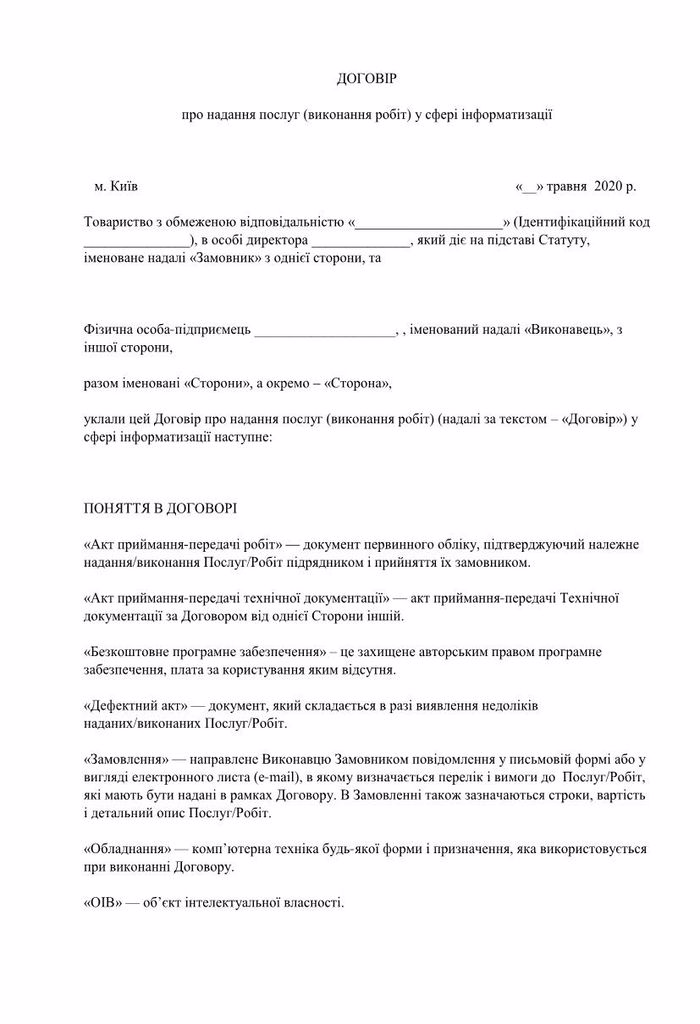What contracts will be needed to carry out activities in the field of IT in Ukraine?

The correct execution of contractual relations with clients (customers) and specialists, i.e. the choice of necessary contracts, depends on the specificity and scale of IT companies.
The most popular in Ukraine are service companies, i.e. those whose work in B2B (Business to Business). Such companies provide software development services by order of other companies.
The main “composition” of service companies is mostly developers, about 90% of all specialists. The scale of such business depends on the number of projects and, consequently, on the number of hired developers who will work on these projects.
Today, we will talk about the contracts and agreements needed for secure work of service and other types of IT companies in Ukraine.
All conditions of contracts with customers (clients), partners must overlap with conditions of contracts with developers (“reflect conditions”).
Contracts (agreements) in the IT sphere can be conventionally divided into those, which protect commercial interests of the company and those, which regulate the relations between the customers (clients) and the developers, within a certain order/project.
You may also like: Tax Optimization of IT-projects in Ukraine when Working with Foreign Clients
Contracts that protect the commercial interests of an IT company
NDA - Non-disclosure Agreement Agreement - an agreement on non-disclosure of confidential information, trade secrets, which belongs to the company. We have already written in detail about how to make such a contract here.
NCA - Non-compete Agreement, which prohibits the employee (developer) to be employed by companies engaged in similar activities, or to participate in projects which are similar to the customer company’s projects and can compete with it.
Not all companies think about such a contract, or take the problem seriously, but they are wrong. We encountered a situation where an IT company was developing a specific product that was the main asset of that company. The company contracted with a developer (a sole proprietor) and did not conclude an NCA. During their cooperation, the company trained this specialist with specific knowledge and skills, handed over all the commercial information, and the developer took all the developments on the final stage of the project and managed to monetize them in his favor.
The NCA should specify the maximum possible limits for the period of “competition”, the sphere, as well as the geographic location. The NCA must clearly define what a competing business means, detailing competitors (with whom cooperation in any form is prohibited). Also the terms of the NCA must comply with the jurisdictional requirements of the country to which it applies. For example, in some European countries, under the terms of the NCA agreement, an IT company must pay a fee to a developer for refraining from working for a competitor, for the entire non-compete period.
NSA - Non-solicitation Agreement prohibits the contractor, a competitor company and/or related third parties from poaching the customer's (employer's) employees.
When drafting this agreement with the customer, the developer (team) who is working on the project must enter into NCA agreements that expressly prohibit them from competing. Otherwise, they could voluntarily move to a competitor to bypass the NSA.
Contracts that govern the relationship between customers and IT developers
The choice of the form of contract with customers depends on the chosen model of cooperation:
- Fixed Price;
- Time & Material (ramped payment, the final cost is not defined);
- Dedicated team (Cost plus) (customer fully manages the team and pays for their work and a fixed % of the IT company for the use of its developers).
The chosen model determines the price and distribution of the risks of cooperation, about all models in detail here.
Risks that need to be taken into account when selecting certain models of cooperation are as follows:
Fixed Price is risky for long-term and large-scale projects, as it is necessary to write all the stages of the project in detail in advance (for a month, a year, or even two years). The IT company is more exposed to risks in this model, since correct calculation of time and resources for the project implementation is required, and if they are calculated incorrectly, the IT company bears these risks at its own expense.
Tip: When you calculate the project budget, you should add the amount to cover these risks to the order amount.
Time & Material - the client (customer) bears the risks. It should calculate the budget and the risks of exceeding it, depending on the complexity and size of the project.
Let’s talk more about possible types of contracts with developers and customers.
You may also like: How to Relocate Your IT Team to Ukraine?
Software development contracts: Their difference from standard service contracts
Traditionally, IT companies work under Software Development Agreement (SDA) or through service agreements (Master Service Agreement, Service Agreement, etc.), which specify the general terms of cooperation and technical tasks.
The SDA contains the general terms of the contract, which, as a rule, remain unchanged. In addition, the SDA is an open-ended agreement, and is valid until all obligations of the parties are met. But the term of these obligations must be defined in the terms of Statement of Work (SoW) to it.
The SoW must reflect the model which the customer and the developer have chosen for cooperation.
For each model of cooperation the SoW must contain its key terms, without which the IT company can lose revenue.
The SoW should contain, for example, for the T&M and DT models, the following:
- maximum detailed description of the project (product), its technical part and payment terms;
- a checklist of the results of the services performed, the developed project or part of it;
As is the case: The Statement of Work did not specify the success criteria by which part of the project was considered completed. The client delayed the payment, and then refused to pay for the project at all, citing the fact that it did not like the quality of the software. The advance payment for the project did not cover these risks, and the IT company lost out on the developer fees.
- The composition of the team (hard skills - professional skills of each developer and their names);
- The client’s rights to change the developer (how long before the client notifies about the desire to replace someone from the team, the criteria for replacement, coordination of the client interview);
- The right of the parties and the procedure for making changes to the already started project;
- The procedure for reporting on the work performed, and their costs;
As is the case: The IT company did not include in the project budget the costs of forming and sending reports, and over the long period of work on the project it took a lot of specialist time. There was a conflict of interest - the developer’s time was not spent on the subject of the order.
- the right or prohibition for the customer to buy out the team of those developers who worked on the project (the conditions and price of the buyout for a customer);
- involvement of the customer - the order of communication with the client and involvement in the process;
As is the case: Let’s say the client is a foreigner (the time difference is 12 hours) - communication will be complicated if there is no agreement on the time for checking messengers. And this can negatively affect the overall deadline of the project.
- use of databases of open source codes by agreement with the client. The client must be aware of, give their consent to the developer’s use of codes from open databases, and know the terms of use of such codes.
Contracts with developers: An Employment Agreement or a Contract with a Sole Proprietor?
When working with IT specialists as developers, you need to correctly fix the relationship with them. This can be done through employment agreements, but most IT companies in Ukraine prefer to work with developers through civil law contracts (CLC).
The advantages of working with developers under the CLC as with sole proprietors are reduction of tax burden and avoidance of bureaucracy of labor relations. But this form of cooperation entails some risks of recognizing such a contract as an employment agreement, and as a consequence - additional tax liabilities and the imposition of fines.
Criteria according to which the State Labor Service may recognize a contract with a sole proprietor as an employment agreement are as follows:
- the contract describes the process of employment and its organization;
- the contract contains the rules of internal labor regulations;
- the contract specifies a certain qualification, profession, position of the developer;
- the developer is guaranteed a salary, guarantees, benefits, compensations.
The main fundamental differences between the Civil Law Contract and the Employment Agreement:
- Civil Law Contracts must specify the result of the work, not the process;
- the developer is responsible for organizing his work under the Contract, and performs it at his own risk;
- under the CLC the result of the work is paid for, and the relations of the parties are limited solely to the performance of the work, the transfer of its results and payment for this result.
In addition to all other contracts, IT companies sometimes use the Invoice for direct payment as a counterpart to the contract, but we do not recommend using this form of contract, because it does not contain all its essential terms.
You may also like: How to Make a Public Offer Agreement?
Full set of contracts, which an IT company needs to operate in Ukraine, may consist of 10-15 or even more positions. We offer an optimal solution: drafting of all necessary documents for the company.
Having your own developed forms of contracts, you will get your standardized business process.
Do you want to be fully prepared and protected while doing business in the field of IT in Ukraine? Don’t hesitate to contact us! We will help both with elaboration of the necessary agreements and with solution of bigger legal issues.
Didn’t find an answer to your question?
Everything about the activities of IT companies in Ukraine here.



